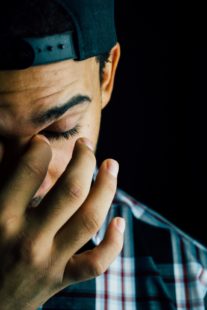Major Depressive Disorder: Signs, Symptoms, and Treatment Options
Christian Counselor Spokane
A large amount of the work I do with clients surrounds the topic of depression. Be it a person feeling down in the dumps, stuck on autopilot, or seeing the world through drawn shades. The symptoms of depression are something that affects everyone I have known in my life. Whether they were experienced for a few moments, a few days, or many years, it’s a term that we all seem to have some experience with and can easily wrap our heads around.
 There are several different depressive or mood-related disorders, and the purpose of this article is to give you the clearest view of what a diagnosis of Major Depressive Disorder involves in terms of presentation, symptoms, prognosis, and treatments available. The information below is collected from the National Institute of Mental Health.
There are several different depressive or mood-related disorders, and the purpose of this article is to give you the clearest view of what a diagnosis of Major Depressive Disorder involves in terms of presentation, symptoms, prognosis, and treatments available. The information below is collected from the National Institute of Mental Health.
Major Depressive Disorder (MDD) is a common and serious medical illness that negatively affects how you feel, the way you think, and how you act. Fortunately, it is also treatable. Depression causes feelings of sadness and/or a loss of interest in activities once enjoyed. It can lead to a variety of emotional and physical problems and can decrease a person’s ability to function at work and home.
Some other forms of depression are slightly different, or they may develop under unique circumstances, such as:
Persistent Depressive Disorder (also called dysthymia) is a depressed mood that lasts for at least two years. A person diagnosed with persistent depressive disorder may have episodes of major depression along with periods of less severe symptoms, but symptoms must last for two years to be considered Persistent Depressive Disorder.
Postpartum depression is much more serious than the “baby blues” (relatively mild depressive and anxiety symptoms that typically clear within two weeks after delivery) that many women experience after giving birth. Women with postpartum depression experience full-blown major depression during pregnancy or after delivery (postpartum depression).
The feelings of extreme sadness, anxiety, and exhaustion that accompany postpartum depression may make it difficult for these new mothers to complete daily care activities for themselves and/or for their babies.
Psychotic depression occurs when a person has severe depression plus some form of psychosis, such as having disturbing false fixed beliefs (delusions) or hearing or seeing upsetting things that others cannot hear or see (hallucinations). The psychotic symptoms typically have a depressive “theme,” such as delusions of guilt, poverty, or illness.
 Seasonal Affective Disorder is characterized by the onset of depression during the winter months when there is less natural sunlight. This depression generally lifts during spring and summer. Winter depression, typically accompanied by social withdrawal, increased sleep, and weight gain, predictably returns every year in seasonal affective disorder.
Seasonal Affective Disorder is characterized by the onset of depression during the winter months when there is less natural sunlight. This depression generally lifts during spring and summer. Winter depression, typically accompanied by social withdrawal, increased sleep, and weight gain, predictably returns every year in seasonal affective disorder.
Bipolar disorder is different from depression, but it is included in this list is because someone with bipolar disorder experiences episodes of extremely low moods that meet the criteria for major depression (called “bipolar depression”). But a person with bipolar disorder also experiences extreme high – euphoric or irritable – moods called “mania” or a less severe form called “hypomania.”
Examples of other types of depressive disorders newly added to the diagnostic classification of DSM-5 include Disruptive Mood Dysregulation Disorder (diagnosed in children and adolescents) and Premenstrual Dysphoric Disorder (PMDD).
Signs and Symptoms of Major Depressive Disorder
If you have been experiencing some of the following signs and symptoms most of the day, nearly every day, for at least two weeks, you may be suffering from depression:
- Persistent sad, anxious, or “empty” mood
- Feelings of hopelessness, or pessimism
- Irritability
- Feelings of guilt, worthlessness, or helplessness
- Loss of interest or pleasure in hobbies and activities
- Increase in purposeless physical activity (e.g., handwringing or pacing) or slowed movements and speech (actions observable by others)
- Decreased energy or fatigue
- Moving or talking more slowly
- Feeling restless or having trouble sitting still
- Difficulty concentrating, remembering, or making decisions
- Difficulty sleeping, early-morning awakening, or oversleeping
- Appetite and/or weight changes
- Thoughts of death or suicide, or suicide attempts
- Aches or pains, headaches, cramps, or digestive problems without a clear physical cause and/or that do not ease even with treatment
 Not everyone who is depressed experiences every symptom. Some people experience only a few symptoms while others may experience many. Several persistent symptoms in addition to low mood are required for a diagnosis of major depression, but people with only a few – albeit distressing – symptoms may receive help from treatment of their “subsyndromal” depression.
Not everyone who is depressed experiences every symptom. Some people experience only a few symptoms while others may experience many. Several persistent symptoms in addition to low mood are required for a diagnosis of major depression, but people with only a few – albeit distressing – symptoms may receive help from treatment of their “subsyndromal” depression.
The severity and frequency of symptoms and how long they last will vary depending on the individual and his or her particular illness. Symptoms may also vary depending on the stage of the illness.
Risk Factors
Depression is one of the most common mental disorders in the U.S. Current research suggests that depression is caused by a combination of genetic, biological, environmental, and psychological factors.
Major Depressive Disorder can happen at any age but often begins in adulthood. Depression is now recognized as also occurring in children and adolescents, although it sometimes presents with more prominent irritability than low mood. Many chronic mood and anxiety disorders in adults begin as elevated levels of anxiety in children.
Depression, especially in midlife or older adults, can co-occur with other serious medical illnesses, such as diabetes, cancer, heart disease, and Parkinson’s disease. These conditions are often worse when depression is present. Sometimes medications taken for these physical illnesses may cause side effects that contribute to depression. A doctor experienced in treating these complicated illnesses can help work out the best treatment strategy.
Risk factors include:
- Personal or family history of depression
- Major life changes, trauma, or stress
- Certain physical illnesses and medications
Treatment and Therapies
Depression, even the most severe cases, can be treated. The earlier that treatment can begin, the more effective it is. Depression is usually treated with medications, psychotherapy, or a combination of the two. If these treatments do not reduce symptoms, Electro-Convulsive Therapy (ECT) and other brain stimulation therapies may be options to explore.
Medications
 Antidepressants are medicines that treat depression. They may help improve the way your brain uses certain chemicals that control mood or stress. You may need to try several different antidepressant medicines before finding the one that improves your symptoms and has manageable side effects. A medication that has helped you or a close family member in the past will often be considered.
Antidepressants are medicines that treat depression. They may help improve the way your brain uses certain chemicals that control mood or stress. You may need to try several different antidepressant medicines before finding the one that improves your symptoms and has manageable side effects. A medication that has helped you or a close family member in the past will often be considered.
Antidepressants take time – usually 2 to 4 weeks – to work, and often, symptoms such as sleep, appetite, and concentration problems improve before mood lifts, so it is important to give medication a chance before reaching a conclusion about its effectiveness. If you begin taking antidepressants, do not stop taking them without the help of a doctor.
Sometimes people taking antidepressants feel better and then stop taking the medication on their own, and the depression returns. When you and your doctor have decided it is time to stop the medication, usually after a course of 6 to 12 months, the doctor will help you slowly and safely decrease your dose. Stopping them abruptly can cause withdrawal symptoms.
In my experience, everyone has a different path that they need to explore when they begin their journey towards healing. There are days I wish that I could pull the magic wand out of my desk and take the feelings of helplessness and hopelessness away.
On those days I am reminded that God has brought struggles and obstacles into their lives for a greater truth to be learned or created – a truth that must be discovered through the events of the journey. I hope that if you are experiencing any of these signs or symptoms that you would consider taking the journey towards restoration.
Resources:
T.N.I.M.H. (2021, January 20). NIMH » Depression. The National Institute of Mental Health. https://www.nimh.nih.gov/health/topics/depression/index.shtml
“Darkness of Depression”, Courtesy of Pixabay, Pexels.com, CC0 License; “Hiding in the Grass”, Courtesy of Darwis Alwan, Pexels.com, CC0 License; “Healthcare Worker”, Courtesy of Thirdman, Pexels.com, CC0 License; “Encircling the Sun”, Courtesy of Lukas Rychvalsky, Pexels.com, CC0 License





